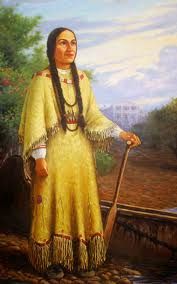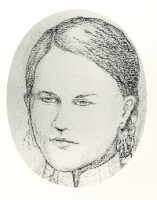
Madeline La Framboise was born on Mackinac island, the daughter of a french trapper and an Ottawa indian. Her father died when she was just three years old and she was raised among her mother’s family in an Ottawa village at the mouth of the grand river in Michigan. At the ripe age of 14 she married trapper Joseph La Framboise. The pair had two children and repeated the marraige for the Catholic church several years later.
During the spring of 1806 young Joseph La Framboise and his courageous wife traveled by canoe from Mackinac and established a trading post one and a half miles west of the present site of Lowell, on the bank of Grand river. There a cabin was built of logs chinked with clay and bark, and about thirty feet long.
Madeline knew the trade, and was a great help in the business so her dealing was essential to its success.
In the spring of 1809 the La Framboises’ were returning from their winter quarters at Mackinac with their usual retinue of French voyageurs and Indians. Dusk coming on they encamped on the lake shore midway between the present cities of Muskegon and Grand Haven. That night Joseph La Framboise was murdered by a drunken Pottawattamie Indian.
Her husband murdered by a drunken indian? Considering that she was half Ottowan herself, and the grandaughter of a chief no less, that seemed a little unlikely. The tale sounded so much like racism I scoured for more stories, but found none. Whatever transpired left Madeline a widow with two small children and a tradepost to manage or sell.
Through the long sad summer that followed Madame La Framboise carried on the work at the trading post so efficiently that the Astor Fur Co. made her the official agent in place of her deceased husband. The Indians held her in high esteem.
“For a female to be that involved in the fur trade — to be the boss — was incredible,” said David Schmid, a Byron Center amateur historian and historical re-enactor who has studied fur trading of the Great Lakes and early French explorers like Étienne Brûlé Robert de LaSalle and Father Jacques Marquette.
She must have been good at what she did. She could neither read nor write but spoke four languages fluently. French, English, Ottawa and Chippewa. She became a wealthy woman at a time when belts were already starting to tighten in the fur trade. She never married again, and she fought off the encroaching competition of Astor for a valiantly long time.
She aptly fended off competition from John Jacob Astor’s American Fur Company until convinced to sell her interest to Rix Robinson in 1818, who moved the post to Ada.
Her role as boss was notable from a European cultural perspective, Schmid said. However, in native culture, which was much more matriarchal, La Framboise’s position as a female businesswoman was likely less surprising.
Not to mention the culture of the animal whose slaughter they were getting rich off. Which also happens to be matriarchal. Or was before it was destroyed. Maddy got out at the right time because by the 1820’s there were very few beaver left in Michigan. Or Wisconsin. Or Wyoming. And ten years later there were not even any left in California. So well did the trappers do their job.

As for La Framboise herself, she died April 4, 1846 on Mackinac Island, where she had become a Sunday school teacher. Her son, Joseph, became a fur trader and lived most of his life along the Minnesota River Valley. Her daughter. Josette, married the brother of President Franklin Pierce and died young.
Her home on the island has become a hotel for tourists, the Harbour View Inn. She was buried beneath the altar of St. Anne’s Catholic Church, beside Josette and a grandson, and later moved to a sepulcher in the church yard.
She was 66 when she died, and at the height of her trade was making 10,000 a month which was far more than her competition. She is remembered as one of Michigan’s first (and finest) business women. She never had her picture taken, but the home on Mackinac island where she retired is still visited and remembered to this day.
La Framboise in English translates to “the rasberry”. So think of her and the tycoon compulsion we have to exploit resources for unspendable amounts of wealth the next time you enjoy this seasonal fruit.







































